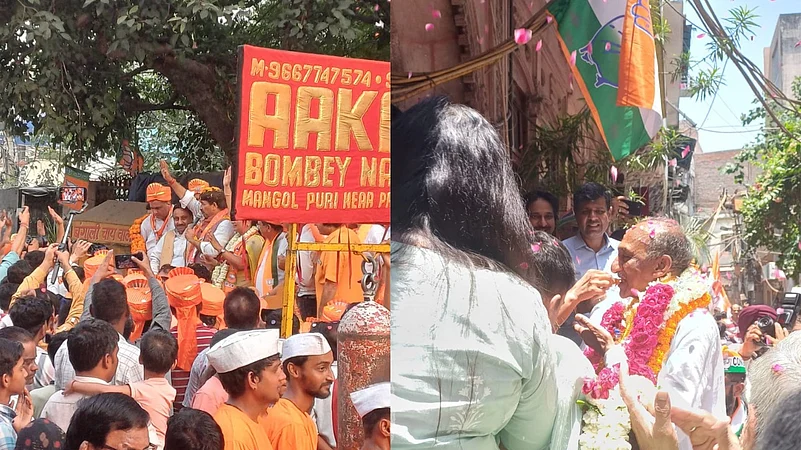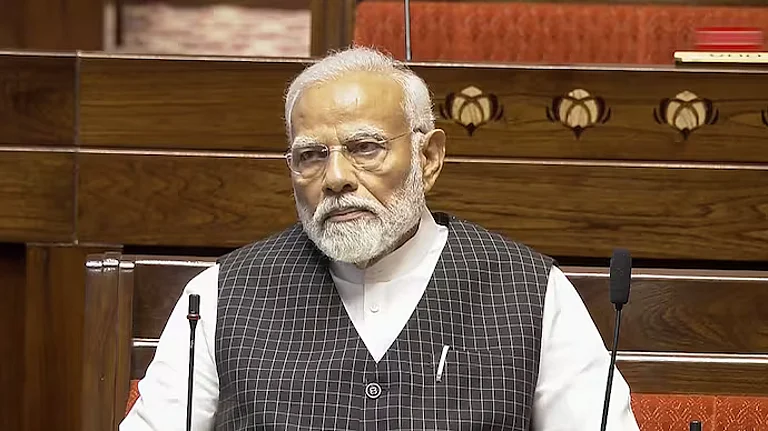On a sunny May afternoon, Delhi’s Chandni Chowk is bustling with tourists. Bang opposite the redeveloped complex is the Red Fort—the historic Mughal structure where India’s first prime minister, Jawaharlal Nehru, hoisted the Indian tricolour on August 15, 1947. Since then, every Indian Prime Minister has headed to the 17th Century monument to celebrate anniversaries of Indian Independence.
The symbolism weighs heavily on Chandni Chowk.
The constituency will play a role in deciding who gets to be on the dais at the Red Fort on August 15.
There is another reason why elections in Chandni Chowk are high-voltage: Since the 1998 Lok Sabha elections, the party that has won this seat has also gone on to form the government at the Centre.
Days ahead of the elections, at this trader constituency, business is as usual. Giant posters of candidates have filled the streets, but there is no palpable political fever on the ground.
A Discerning Electorate
There are around 15.6 lakh voters in Chandni Chowk, Election Commission data says. Of these, a little less than 63 per cent had turned up to vote in 2019. Voters of Chandni Chowk are not set on political loyalties, switching parties every Lok Sabha and Assembly elections.
In both 2014 and 2019, it was the Bharatiya Janata Party (BJP) that won the Lok Sabha seat from Chandni Chowk. Harsh Vardhan, an otorhinolaryngologist (a doctor who specialises in surgical treatment of conditions of the head and neck) by profession, was Chandni Chowk’s representative in Parliament. He won the 2019 Lok Sabha elections from the constituency with 53 per cent of the vote.
But less than a year later, when Delhi voted in the Assembly elections, all 10 Assembly constituencies within the Chandni Chowk parliamentary constituency elected Aam Aadmi Party (AAP) members.
What is Chandni Chowk voting on?
There are three things dominating political conversations in the constituency: Modi, freebies and employment—or the lack thereof. Pitam, who sells tea near the Paranthe Vali Gali, says he has two sons and he is anxious about their prospects for employment. “I have spent on their education, but I am not sure whether they will manage to secure jobs,” he says. But his anxieties do not get in the way of his admiration for Prime Minister Narendra Modi. “He has raised the status of the country, we trust him to find a solution,” he says.
Pitam’s anxieties are echoed by many, his optimism not by all.
Sitting outside a lehenga store at the entrance of the Chandni Chowk complex, a man in his 30s says, “The development the government claims has not reached us. The issue of unemployment is huge, but they do not want to understand.” He says traders in the area have suffered because of the Goods and Services Tax (GST).
Traders make up a bulk of the electorate in Chandni Chowk. The constituency is home to hundreds of shops that see heavy footfall through the week. A shopkeeper who runs one of these shops says, “PM Modi has done good work. India will become the third-largest economy soon. The issues we are facing are temporary, but the national government is being run well.”
On the question of freebies, there is a deep divide. Not in terms of their efficacy, but on who has delivered them.
Shoaib, who pulls a rickshaw in Chandni Chowk’s Chawri Bazaar area, says the Delhi government helmed by Arvind Kejriwal has been helping the poor since the lockdown imposed to stem the tide of the Covid-19 pandemic. “The Delhi government has been helping my family for a long time and we will vote for Congress to help the alliance,” he says.
But Sant Kumar Tiwari, a man standing near Chandni Chowk’s municipal office, says Prime Minister Modi has helped build houses for the poor in small villages. “It’s giving dignity to people and providing them relief for the long term,” he adds.
Who will Chandni Chowk vote for?
With Harsh Vardhan retiring from politics, BJP has chosen a fresh candidate in Chandni Chowk in Praveen Khandelwal. Sixty-four years old, Khandelwal is also the secretary general of the Confederation of All India Traders. Khandelwal is up against Congress veteran Jai Prakash Agarwal. Agarwal has previously represented Chandni Chowk in Parliament from 1984 to 1991 and again from 1996 to 1998.
Speaking to Outlook Business, Khandelwal says the BJP’s strategy is to help generate employment by developing the strengths of the area. "We will craft a comprehensive development plan to help traders and citizens living in Chandni Chowk. Special focus must be on wholesale trade in the area as it is one of the largest hubs of the country,” he adds.
The BJP is betting on Khandelwal’s experience as leader of traders’ bodies to see him through. One of the campaign songs for Khandelwal speaks of how he helped many traders during the Delhi sealing drive when the Municipal Corporation of Delhi had decided to shut a large number of shops that it had deemed illegal.
The Modi government’s track record is also part of Khandelwal’s campaign. At a roadshow in Shalimar Bagh, BJP campaigners reminded the electorate about welfare schemes brought in by the Modi government.
Congress, on the other hand, wants to make the Chandni Chowk contest more localised. Congress workers in the constituency say Agarwal’s name is well known and their campaign is focused on his ‘son-of-the-soil’ image. A Congress worker walking in one of the campaigns says, “In many areas, he [Agarwal] is receiving support because of his image. People can reach out to him to address their issues.”
Agarwal has promised better roads, employment, environment and changes in the structure of the GST if he gets elected.
The Final Call
With economics looming large over the Chandni Chowk elections, parties are also focused on mathematics. The BJP will be looking to repeat its 2019 performance, securing 53 per cent of the vote. If that happens, the Congress and AAP together will find it difficult to win the seat. The two parties, contesting separately last time, secured 30 per cent and 14 per cent of the vote respectively.
“We will win Chandni Chowk, Delhi and the nation,” Khandelwal says he is sure.
Congress workers on the ground say the contest will be closer. They hope the polls follow the 2014 pattern when the AAP and Congress together had 49 per cent of the vote, while the BJP had 44 per cent.
Delhi votes on May 25. The votes will be counted on June 4. Will what happens in Chandni Chowk serve as a bellwether for what will happen in the whole nation? We will know in two weeks.
































